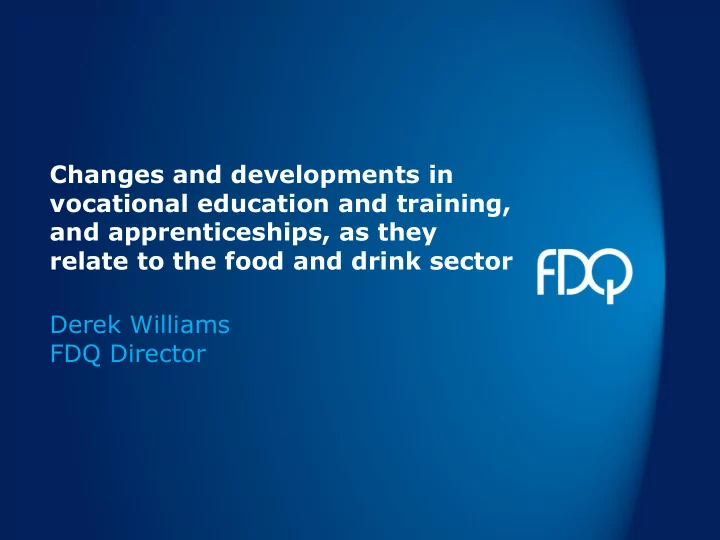

Changes and developments in vocational education and training, and apprenticeships, as they relate to the food and drink sector Derek Williams FDQ Director
About FDQ • A recognised Awarding Organisation with over 100 approved centres in England, Wales, N. Ireland and Eire • Full portfolio of Food and Drink Sector (SSA 4.2) regulated qualifications: o Compliance e.g. food safety o Competence-based, largely for Apprenticeships o Vocationally-related, largely for Study Programmes • Portfolio of Endorsed Programmes -accrediting training • Based in Leeds with an expert team that designs, develops, awards and externally quality assures qualifications • Owned by a charity o Food and Drink Training and Education Council
Political imperatives Apprenticeships • Entry to work programmes e.g. Traineeships • English and Mathematics achievement (L1/2) • Vocational programmes that provide specified • progression and employment opportunities e.g. Study Programmes Learner loans for Adult programmes • Regulation of qualifications and inspection of training • Public funding restrictions, focus on 16-18yrs • Uncertainty about National Occupational Standards •
Apprenticeships England overall policy target 3m apprenticeships by 2020, food • sector a priority transition to new ‘Trailblazer’ Apprenticeship Standards • 2016-17 - end assessment, employer £contribution Improve/F&DNSA leading on 5 food trailblazers for 2016 • - including Food Technologist (level 3) FTC leading on butchery occupations • F&D one of few sectors in double digit declining take-up • of apprentices over past 2 years success/timely completion rates about two-thirds • English and mathematics achievements - difficult •
Apprenticeships Wales Reform to align apprenticeships model to needs of Welsh • economy – consultation evaluation July15 Direction of travel • o need for higher apprenticeships @L4 o funding by stages not ages o improved comms/marketing N.Ireland New Apprenticeship system plans • Direction of travel • o only for new employees/job roles o L3 to L8 with a single occupational qualification o other programmes for transition to L2 o driven by Sectoral Partnerships
England – other learning Priorities Government’s reform plan for vocational qualifications Fixing the foundations – FE focus on technical and professional education, and 2 nd chance students Continuing the Prof Wolf hypothesis; public funding for programmes not qualifications Challenges: i mplementing rigorous ‘Technical’ qualifications • Awards/Certificates/Levels, approved by DfE ensuring that Study Programmes (16-18yrs) are • purposeful, with meaningful work experience Adult programmes (19+yrs) difficult to deliver with • reduced public funding and de-listed qualifications 24+yrs Learner Loans • Ofsted -New Common Inspection Framework Sept 15 •
England – 14-19 Vocational pathways 16-19yrs Study Programmes Progression Tech Certificate/Level L2/L3 at 18-19yrs to: 14-16yrs University degree 16-19yrs GCSEs Apprenticeship L2/3 or and Apprenticeship Technical Awards or Employment 16-19yrs Traineeship (work experience)
Qualifications Diverging qualifications across both Nations and Awarding Organisations England and N.Ireland Qualifications and Credit Framework (QCF) being • replaced by Regulated Qualifications Framework (RQF) 1 st Oct 2015 Concept of credit not promoted • Qualification size determined by TQT • No routine sharing of structures/units, common • sector qualifications only possible by special arrangement Wales New qualifications regulator – Qualifications Wales •
Points for discussion 1. How will the new Food Technologist Apprenticeship be supported in implementation, to ensure it contains valid qualifications and is successfully taken up? 2. What is the most effective way to develop, a new and valid ‘Tech Level’ (L3) Food Science/Technology qualification, for delivery in Further/Higher Education, to support progression to University degree or employment? 3. What are the implications of having more and significant differences between qualifications/ programmes across Nations and across Awarding Organisations?
Thank you
Recommend
More recommend